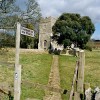The 1846 Summer Assize started with all of the usual pomp and ceremony. The Judges, Mr Justice Erle and Mr Baron Platt, arrived in Dorchester at seven o’clock on the Friday evening and were met just outside of the town on the London Road by The High Sheriff, Charles Porcher Esq., accompanied by his Under Sheriff, Thomas Coombs, Jnr., Esq., and other officials.
The Judges were then escorted in a procession led by a corps of Javelin Men in fine liveries, under the command of Mr. Mark Baker. The Sheriff and Under Sheriff followed in their official carriage drawn by four horses and the cavalcade made its way to the Shire Hall.
On Saturday morning the Judges accompanied by the High Sheriff attended a service at St. Peter’s Church where the Rector, the Rev. J.M. Colson, welcomed them. The mayor of Dorchester, George Curme Esq., was present, accompanied by the borough magistrates and members of the council. The Rev. Charles Baring Coney of Kimmeridge preached the Assize Sermon.
In an address before the commencement of the hearings Mr. Baron Platt commented “there have been great efforts made in this country of late years, by the nobility, by the gentry, by the influential traders of this land, and particularly by the ladies, which I am happy to say have had a beneficial effect.” He went on to say that there had been a real diminution of crime throughout the country but that this improvement had not extended too the southern counties, including Dorset.
The Judge said, “It happens too often that the child of crime, after conviction and suffering punishment, is cast out of prison friendless, characterless, cheerless.” He continued: “surely, gentlemen, it is useful if something can be done for the purpose of giving a reasonable means of bringing back, if possible, this individual to the station he once held in society.” We hear echoes of this today.
It is worthwhile looking at some of the cases heard and the punishments handed down.
William Rideout, aged 56, was before the court accused of stealing six bushels of potatoes, the property of Richard Paviour, at Sturminster Newton Castle. The prosecutor had put the potatoes in a box in his stable from where they were taken. The local newspaper report says “suspicion was excited, and at the bottom of the prisoner’s garden a heap of potatoes was found covered over with grass, just the quantity that was lost, and the same, a mixture of white and purple.” The jury found the prisoner guilty but recommended he be dealt with leniently on account of a long prison sentence he had already served. Mr Rideout was sentenced to be imprisoned for two months, with hard labour.
Charles Barnes, aged 16, was charged with stealing a silver spoon from his master, Mark Andrews, at East Burton. The prisoner left Mr Andrew’s employment without giving any notice; the spoon when missed was traced to a silversmith’s at Wareham. Charles Barnes had sold it for 9s 6d and told the court he had picked it up in the road but the jury did not believe him and found him guilty. He was imprisoned for 6 months, with hard labour.
On a charge of murder was James French, aged 35, found to be suffering from insanity but nevertheless guilty and sent to prison. The following extract from the evidence given by Thomas Jackson to the court provides an insight into life and the sleeping arrangements in a lodging house of that time.
“I keep a lodging-house at Lyme Regis; I knew the prisoner, who was lodging in my house on the night of the 8th instant. At half-past ten at night I saw him in the bedroom, and carried him a cup of coffee; three of my children and John Steers, the deceased, were in two other beds; I saw Steers in bed, and he was asleep at the time I was in the room; I remained about five minutes, and went down to supper, and then retired to bed about eleven o’clock; I saw that French was awake when I was going to bed, and I desired him not to disturb me again, and wished him good night.”
Perhaps the most interesting case to be heard was that of George Boyt, charged with killing and slaying Isaac Gerrard at Corfe Mullen by shooting him. He pleaded guilty and the jury returned a verdict of guilty but without malicious intent. Mr Baron Platt sentenced him to one month in prison without hard labour. Boyt was no doubt relieved at the sentence and probably a little apprehensive when a little while later the Judge called him back before him. The Judge told him he had reconsidered his sentence and because he was convinced there was no malicious intention he reduced the sentence to one week in prison without hard labour. George Boyt was released two days later on the 23rd July 1846.



